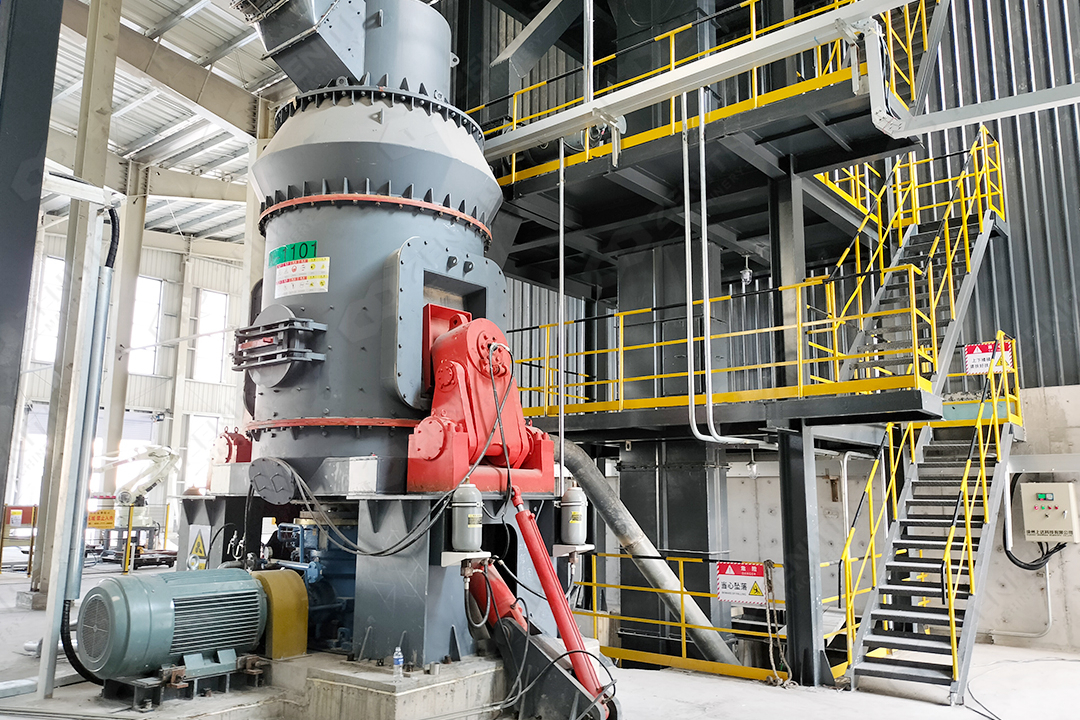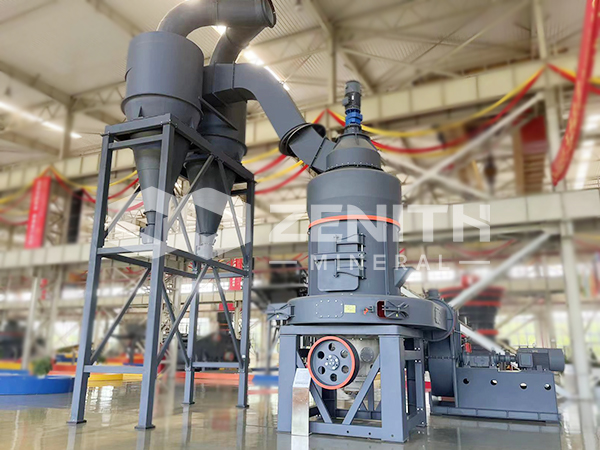The limestone + calcium hydroxide slag grinding project produces a finished product with a fineness of 325 mesh (d90), intended for power plant desulfurization.
2025-11-08 18:30:54
In the relentless pursuit of cleaner energy production, flue gas desulfurization (FGD) remains a critical process for power plants worldwide. The efficacy of this process is fundamentally dependent on the quality and characteristics of the sorbent used, most commonly limestone or its derivative, calcium hydroxide. Achieving the optimal particle size distribution, specifically a fineness of 325 mesh (d90), is not merely a specification—it is the cornerstone of efficient and cost-effective desulfurization. This target ensures maximum surface area for the chemical reaction with sulfur dioxide, leading to higher removal efficiency, reduced sorbent consumption, and minimized waste.

For project engineers and plant managers, selecting the right grinding technology is a decision with far-reaching implications for operational expenditure (OPEX), capital expenditure (CAPEX), and environmental compliance. The challenge lies in transforming raw limestone or industrial by-product calcium hydroxide slag into a consistently fine, reactive powder without incurring prohibitive energy costs or maintenance downtime. The 325 mesh (d90) benchmark is particularly demanding, requiring a mill that can deliver precise classification and uniform product quality.
The Engineering Challenge: Precision Grinding for Maximum Reactivity
The primary goal in FGD sorbent preparation is to maximize the specific surface area of the particles. A finer particle, such as one that passes through a 325-mesh screen, exposes more reactive sites per unit mass, dramatically accelerating the reaction with SO2 in the scrubber. The "d90" specification is crucial; it means that 90% of the particles by weight are smaller than 44 microns. This guarantees a high proportion of ultra-fine, highly reactive material, while a small fraction of slightly coarser particles can aid in handling and flowability. Utilizing calcium hydroxide slag, often a by-product from other industrial processes, adds another layer of complexity, as its moisture content and initial particle structure can vary significantly.
_1762597854478.jpg)
Traditional grinding solutions, like ball mills, have been used for decades. However, their high energy consumption and relatively broad particle size distribution often make them a less optimal choice for modern, efficiency-driven power plants. The industry is increasingly turning to more advanced, integrated milling systems that offer superior control over fineness and significantly lower operating costs.
Zenith's Tailored Solutions for Desulfurization Sorbent Production
At Shanghai Zenith Machinery, we understand that a one-size-fits-all approach is insufficient for critical applications like power plant desulfurization. Our research and engineering focus has led to the development of grinding equipment that excels in producing 325-mesh powder with exceptional efficiency and reliability. Two of our flagship models, the MTW European Trapezium Mill and the LM Vertical Grinding Mill, are particularly well-suited for this project scope.
The MTW European Trapezium Mill is engineered for high-capacity fine powder production. With an output range that perfectly encompasses the 30-325 mesh requirement, it is a robust and versatile choice. Its key advantage lies in its remarkable energy efficiency, consuming over 60% less power than a traditional ball mill of the same capacity. For a power plant running continuous desulfurization, this translates to massive operational savings. Furthermore, the MTW series features a modular impeller adjustment device, allowing operators to fine-tune the output fineness with ease—a critical feature for consistently hitting the d90 target. The integrated high-efficiency impeller fan (85% air induction efficiency) ensures smooth material circulation and classification within a compact, self-contained system that reduces the need for extensive plant infrastructure.
_1762597854480.jpg)
For projects demanding the utmost in automation and space savings, the LM Vertical Grinding Mill presents a compelling alternative. Its vertical structure occupies approximately 50% of the area of a ball mill system, a significant advantage for plant layout. The LM mill operates with a high degree of automation, enabling remote control and stable, 24-hour operation with minimal human intervention. Its working principle, involving material bed comminution between rollers and a grinding disc, is not only energy-efficient but also produces a product with high purity and controlled chemical composition, which is vital for consistent desulfurization performance. The sealed, negative-pressure operation ensures a dust-free environment, aligning with the highest environmental standards of the power industry itself.
Case for Advanced Technology: Beyond Basic Grinding
The decision to invest in advanced grinding technology from Zenith is an investment in the long-term economics and reliability of the FGD system. The superior particle size control directly leads to a reduction in limestone or slag consumption, as less unreacted material is wasted. The lower energy consumption of our mills directly cuts electricity costs, a major component of OPEX. Moreover, the durability and low-maintenance design of our MTW and LM mills minimize unplanned shutdowns, ensuring a continuous supply of sorbent and supporting the power plant's overall availability.
_1762597854482.jpg)
Our equipment's compliance with international standards, including ISO, CE, and CU-TR, provides an additional layer of confidence in their quality, safety, and global applicability. With a presence in over 180 countries and technical support offices in more than 30, Zenith is positioned to provide not just a machine, but a comprehensive partnership for the entire project lifecycle.
In conclusion, the successful implementation of a limestone and calcium hydroxide slag grinding project for power plant desulfurization hinges on selecting a grinding system that is precise, efficient, and reliable. By focusing on the specific need for 325 mesh (d90) fineness, Zenith's MTW and LM mills offer technologically advanced solutions that optimize both the chemical efficiency of the desulfurization process and the financial performance of the power plant.
_1762597854483.jpg)
Frequently Asked Questions (FAQs)
- What is the significance of the 'd90' specification for desulfurization sorbent?
The 'd90' value indicates that 90% of the powder particles are below a specific size (44 microns for 325 mesh). This ensures a high surface area for efficient SO2 capture while allowing a small fraction of coarser particles for better handling. - Can your mills handle moist or sticky materials like certain calcium hydroxide slags?
Yes, both the MTW and LM mills can be equipped with or integrated with drying systems. The LM Vertical Mill, in particular, is designed to handle hot air input simultaneously with grinding, making it effective for materials with some moisture content. - How does the energy consumption of your mills compare to a traditional ball mill?
Our MTW and LM grinding mills typically demonstrate energy savings of over 60% compared to ball mills of equivalent output and product fineness, significantly reducing operational costs. - What kind of after-sales support and service do you provide globally?
We have overseas offices in over 30 countries and a network of technical partners, providing installation guidance, commissioning support, operator training, and readily available spare parts. - Is the output fineness adjustable should our process requirements change in the future?
Absolutely. Our mills, especially the MTW series with its modular impeller system, are designed for easy adjustment of output fineness, allowing you to produce different grades of powder without major hardware changes. - Do you offer a complete system or just the main grinding mill?
We can supply a complete system, including the jaw crusher for primary size reduction, bucket elevator, vibrating feeder, grinding mill, powder classifier, and pulse dust collector, ensuring a seamless and integrated solution. - Are your mills certified for international use?
Yes, our equipment holds ISO international quality system certification, European Union CE certification, and Customs Union CU-TR certification, ensuring compliance with major international market standards.









